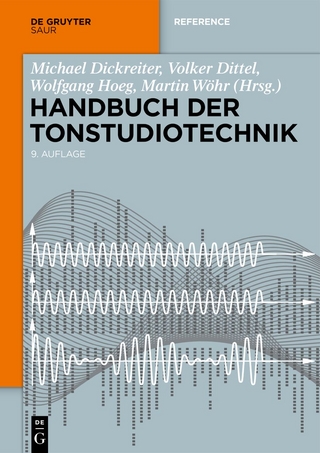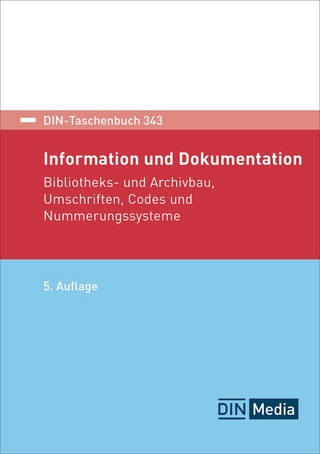
Organizing Library Collections
Rowman & Littlefield (Verlag)
978-1-5381-0851-2 (ISBN)
Libraries organize their collections to help library users find what they need. Organizing library collections may seem like a straightforward and streamlined process, but it can be quite complex, and there is a large body of theory and practice that shape and support this work. Learning about the organization of library collections can be challenging. Libraries have a long history of organizing their collections, there are many principles, models, standards, and tools used to organize collections, and theory and practice are changing constantly.
Written for beginning library science students, Organizing Library Collections: Theory and Practice introduces the theory and practice of organizing library collections in a clear, straightforward, and understandable way. It explains why and how libraries organize their collections, and how theory and practice work together to help library users. It introduces basic cataloging and metadata theory, describes and evaluates the major cataloging and metadata standards and tools used to organize library collections, and explains, in general, how all libraries organize their collections in practice. Yet, this book not only introduces theory and practice in general, it introduces students to a wide range of topics involved in organizing library collections. This book explores how academic, public, school, and special libraries typically organize their collections and why. It also discusses standardization and explains how cataloging and metadata standards and policies are developed. Ethical issues also are explored and ethical decision-making is addressed. In addition, several discussion questions and class activities reinforce concepts introduced in each chapter. Students should walk away from this book understanding why and how libraries organize their collections.
Gretchen Hoffman is an Associate Professor in the School of Library and Information Studies at Texas Woman’s University. She has been teaching there since 2007. Her teaching and research agenda centers on the organization of information, specifically library cataloging. Courses she teaches include Cataloging and Classification, Advanced Cataloging and Classification, Collection Development, and Information Organization. Before moving to Texas Woman’s University, Hoffman was a professional cataloger at the University of Kansas, specializing in complex and difficult cataloging, music cataloging (scores and audio recordings), and cataloging German-language monographs. Prior to that, she worked as a professional serials cataloger at Portland State University, specializing in federal government documents.
Part I: Theory of Organizing Library Collections
1: Purpose and History of Organizing Library Collections
Library Collections
How Library Collections are Organized: Theory
How Library Collections are Organized: Practice
Factors That Influence Organization in Libraries
Limits to Organizing Library Collections
History of Organizing Library Collections
2: Metadata and Encoding: Fundamental to Organizing Library Collections
Metadata
Types of Metadata
Purpose of Metadata
Metadata Standards
Metadata Created in Libraries
Encoding Standards and Markup Languages
Encoding Standards in Libraries: MARC
Encoding Standards in Libraries: Digital Collections
3: Describing and Providing Access to Library Collections
Descriptive Metadata and its Purpose
Descriptive Metadata in Libraries: Descriptive Cataloging
Resource Description and Access (RDA)
Other Content Standards
Metadata Schemas Used in Libraries
4: Providing Subject Access to Library Collections
Subject Analysis
Controlled Vocabularies
Uncontrolled Vocabularies
Controlled Vocabularies Used in Libraries
Library of Congress Subject Headings
Children’s Subject Headings
Library of Congress Genre/Form Terms (LCGFT)
Sears List of Subject Headings
Medical Subject Headings (MeSH)
Faceted Application of Subject Terminology (FAST)
Other Controlled Vocabularies
5: Classifying Library Collections
Classification
Library Classification
Library Classification: Construction Issues
Library Classification: Application Issues
Arranging Library Collections
Classification Schemes Used in Libraries
Dewey Decimal Classification
Library of Congress Classification
National Library of Medicine Classification
Superintendent of Documents Classification
Other Library Classification Schemes
Alternative Library Classification
Part II: Practice of Organizing Library Collections
6: Organizing Library Collections: Standards and Policy Development
Standardization
The System of Standards
Standards and Policy Development at the International Level
Standards and Policy Development at the National Level
Standards and Policy Development at the State and Regional Level
Cataloging Policy Development at the Local Level
7: How Libraries Organize Their Collections
Cataloging Practice
Monographs, Serials, and Electronic Resources
Organizing Books
Organizing Serials
Organizing Media and Other Formats
Government Publications
Metadata Practice
Issues in Cataloging and Metadata Practice
8: Organizing Collections in Academic, Public, School, and Special Libraries
Similarities and Differences Among Libraries
Academic Libraries
Public Libraries
School Libraries
Special Libraries
9: Ethical Issues in Organizing Library Collections
Neutrality and Power
Ethics and Values Statements
The Role of the User
Less Customization
Bias and Marginalization in Subject Standards
Ethical Obligations of Catalogers and Metadata Specialists
10: Current Developments in Organizing Library Collections
Linked Open Data
Linked Data in Libraries
Identity Management
Electronic Resources
Metadata Work
Discovery Products
| Erscheinungsdatum | 23.08.2019 |
|---|---|
| Verlagsort | Lanham, MD |
| Sprache | englisch |
| Maße | 152 x 231 mm |
| Gewicht | 526 g |
| Themenwelt | Sozialwissenschaften ► Kommunikation / Medien ► Buchhandel / Bibliothekswesen |
| ISBN-10 | 1-5381-0851-8 / 1538108518 |
| ISBN-13 | 978-1-5381-0851-2 / 9781538108512 |
| Zustand | Neuware |
| Haben Sie eine Frage zum Produkt? |
aus dem Bereich


